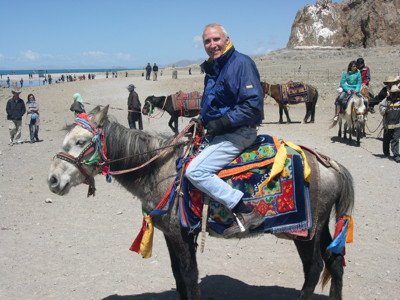Seven Years in Tibet: Tibetan Butter Tea Recipe 🥁🥁🥁🥁🥁
/Year Released; 1997
Directed by: Jean-Jacques Annaud
Starring: Brad Pitt, Jamyang Jamtsho Wangchuk, David Thewlis, Lhakpa Tsamchoe, BD Wong
(PG-13, 136 min.)
Genre: Drama (based on true story)
“If you can imagine a hidden place tucked safely away from the world, concealed by walls of high, snowcapped mountains, a place rich with all the strange beauty of your nighttime dreams, then you know where I am.” –Heinrich Harrer (Brad Pitt) in a letter to his son
A delightful journey where snow capped peaks, avalanches, hostile armies, and cutthroat bandits are just the background. The real war is internal, with Brad Pitt as the Austrian mountain climber who is as walled off from others as “Tibet, the roof of the world.”
And he is not too happy about it at times.
“So much time to question oneself is not good.” –Heinrich Harrer
Nor is he about to part with his Western ways, at least not at first, as the lovely Tibetan tailor Pema (Lhakpa Tsamchoe) tells his as he brags about himself.
Pema Lhaki: Still, walking up mountains is a fool's pleasure, Heinrich.
Heinrich Harrer: Not so foolish, really. Look at this. Go ahead. That's after I climbed the Eiger North Face. That's Olympics. Gold medal. Not important... this.
Pema Lhaki: Then this is another great difference between our civilization and yours. You admire the man who pushes his way to the top in any walk of life while we admire the man who abandons his ego. The average Tibetan wouldn't think to thrust himself forward this way.
***
Earlier on we see Heinrich’s arrogance on full display, especially when he chooses to go climbing in the Himalayas instead of staying home with his his pregnant wife. She walks away and out of his life. Only later on does he admit to the young Dalai Lama (Lhakpa Tsamchoe), who becomes his close friend:
Heinrich: I was married but I'm divorced.
Dalai Lama: What did you do?
Heinrich: I didn't want a child so I ran away to climb a mountain.
His selfishness is also revealed on the climb itself. He hides a serious injury from the team, saying it is his problem. But Peter Aufschnaiter (David Thewlis) begs to differ. An injured climber cannot pull his weight, let alone save a comrade.
“Next time you lie about an injury, Heinrich, you're off the team.” – Peter
Later on, when the two are the sole climbers, having escaped from a British Prisoner of War camp the two Austrians are locked up in as WWII interrupts their ascent, Heinrich sells off Peter’s family heirloom watch, even though he has at least two others, “cheap junk “ from Italian prisoners.
Heinrich:Take your stinking watch and shut up! I don't need another boring sermon from some frustrated glorified tour guide.
Peter: No wonder you are always alone. No one can stand your miserable company.
Yet it is Heinrich’s arrogance and its very slow decline that propels the film forward. We laugh when he and Peter show Pema what the local merchants hawk as “meat cutters,” are really for – ice skating. He shows off, but no one is really watching. Only after his friend “gets the girl” does he start to change.
But Heinrich’s ultimate growth comes from the Dalia Lama, who, in reality, is the film’s showstopper. His childlike enthusiasm is what ultimately disarms Heinrich, especially his name for the Austrian, Yellow Head, whose hair he loves to tussle.
Yellow Head, I would like to learn about the world you come from. For example, where is Paris, France, and what’s a Molotov Cocktail, and who’s Jack the Ripper.
Later he gets Heinrich to admit even more, this about himself and not the world:
When you're climbing your mind is clear and free from all confusions. You have focus. And suddenly the light becomes sharper, the sounds are richer and you're filled with the deep, powerful presence of life. I've only felt that one other time… In your presence, Kundun. (The Dalai Lama’s title, which means “presence.”)
***
Yet it takes the complete rejection from the son Heinrich now wants, building a movie house and somehow not disturbing the worms in the ground, regarded as life forms to be protected according to the Buddhist belief in reincarnation,
Dalai Lama: But you see, Tibetans believe all living creatures were their mothers in a past life. So we must show them respect and repay their kindness. And never, never harm anything that lives. You can not ask a devout people to disregard a precious teaching.
Heinrich:Yes but Your Holiness, with due respect, erm, we can't possibly
[laughs] I'm sorry, but we can't possibly save all the worms! Not if you want a theater in this lifetime.
Dalai Lama: You have a clever mind. Think of a solution. And in the meantime you can explain to me, what is an elevator.
…as well as the cruel invasion of Tibet by the Maoist Chinese regime to fully enlighten Heinrich. And he comes to loathe the senior official who first befriended him, played at his opportunist, ingratiating best by Law and Order’s B.D. Wong, who tells Heinrich,
When you are not strong enough to fight, you should embrace your enemy. With both arms around you he cannot point a gun at you. Nothing in politics is a matter of honor, my friend.
After returning the prized Western Jacket once gifted to him, a supreme insult by Tibetan standards, Heinrich speaks his contempt:
“There was a time that I would have wished you dead but your shame shall be your torture and your torture will be your life! I wish it to be long.”
This Chinese invasion also causes Heinrich to acknowledge his own shame as an Austrian who at first embraced the Nazis, even becoming Nazi Schutstaffel (SS, defense echelon) for a short time.
The fears of war on my friends' faces... strike a deeply buried personal chord. Echoes of the aggressions of my own country... the will to overpower weaker peoples... bring shame to me. I shudder to recall how once long ago I embraced the same beliefs... how at one time I was, in fact no different from these... intolerant Chinese.
A final note: Perhaps the actor Brad Pitt, Hollywood heartthrob, also learned something during the 1997 filming.
Brad Pitt with “White.” one of the 3 stray dogs that he adopted in Argentina.
In September 1996, in full "bradmania", the actor settled in Mendoza, to film "Seven years in Tibet."
In the city, he picked up 13 dogs from the street, was in charge of feeding them, taking them to the vet, and then placing them in homes.
Of those dogs, three were taken to Buenos Aires.
At the five-star hotel where he was staying, he asked for an exclusive room for his 3 rescuers.
The three puppies flew with him to Los Angeles, California.
In our country and around the world, we also are on the cusp on chaos and crisis. It is a time for our renewal, too.
This must see film from a quarter of a century ago is a first step on that journey.
–Kathy Borich
🥁🥁🥁🥁🥁
Trailer
Footloose foodie
Heinrich’s spiritual journey is mirrored in his relationship with fellow mountaineer, Peter Ausschnaiter ( David Thewlis). The two clash early on, mainly due to Heinrich’s arrogance and selfishness. And it is Peter who wins the affections of the very pretty tailor, Pema Lhaki (Lhakpa Tsamchoe), not the more handsome and outwardly charming Heinrich.
On his final visit with Peter and Pema, we see a transformed (well, almost) Heinrich paying his final visit and sharing the traditional Butter Tea with them. It is not really a drink most Westerners would like, but Heinrich politely sips. A second glass, even the reformed Heinrich cannot stomach, though, and he refuses.
Heinrich Harrer: No, no, no. One was enough.
Peter Aufschnaiter: [continues pouring] Yes. We must follow the custom. A fresh cup of tea is poured for the loved one departing.
[picks up the tea]
(Heinrich hesitates)
Peter Aufschnaiter: No, no, no, no, no. It sits untouched, waiting for his return.
A beautiful parting drenched in symbolism and brewed in friendship. Welcome this as a new tradition when you part with those you hope to return.
***
For most people, Tibetan butter tea — po cha — is an acquired taste, since it is salty rather than sweet, and has a completely unexpected flavor.
Many non-Tibetans don’t care for it much at first, but come to love it when it is associated with warmth on a cold day and good times spent with Tibetan friends, or the adventure of travel in Tibet or Tibetan communities in India or Nepal.
Some non-Tibetans find it helpful to think of it as a sort of light soup rather than as tea.
This way, your mind isn’t so shocked when you drink it! Anyway, the recipe is very simple and easy to try, unlike the longer way it is prepared in Tibet. Here is the longer way, but our recipe is much simpler.
In Tibet, the traditional process of making butter tea can take a long time and is pretty complicated.
People use a special black tea that comes from an area called Pemagul in Tibet.
The tea comes in bricks of different shapes, and we crumble off some tea and boil it for many hours.
We save the liquid from the boiling and then whenever we want to make tea, we add some of that liquid, called chaku, to our boiling water.
For the butter and milk, Tibetans prefer to use butter and milk from the female of the yak species, which in Tibet are called dri, than cow’s milk or butter.
Often mistakenly called “yak butter” and “yak milk,” these have a more pungent flavor than cow’s milk or butter, with a taste closer to goat milk or cheese.
Here is a Yak, and some other photos from my husband’s trip to Tibet in 2007.
Tibetan Butter Tea
Ingredients
· 4 cups of water
· Plain black tea (2 individual teabags, like Lipton’s black tea, or two heaping spoons of loose tea)
· 1/4 teaspoon salt
· 2 tablespoons butter (salted or unsalted)
· 1/3 cup half and half or milk
Materials needed: One churn, blender, or some other large container with a tight lid to shake the tea up with.
This po cha recipe is for two people — two cups each, more or less.
· First bring four cups of water to a boil.
· Put two bags of tea or two heaping tablespoon of loose tea in the water and let steep while the water is boiling for a couple of minutes. (We like the tea medium strength. Some Tibetans like it lighter, so would need only one tea bag. Others like it stronger, so would use 3 tea bags.)
· Add a heaping quarter of a teaspoon of salt.
· Take out the tea bags or if you use loose tea, strain the tea grounds.
· Add a third to a half cup of milk or a teaspoon of milk powder.
· Now turn off the stove.
· Pour your tea mixture, along with two tablespoons of butter, into a chandong, which is a kind of churn. Since churns are kind of rare outside of Tibet, you can do what some Tibetans do, which is to use any big container with a lid, so you can shake the tea, or you can just use a blender, which works very well. (We use a plastic churn that we have not seen for sale anywhere, but most Tibetans use a blender.)
· Churn, blend or shake the mixture for two or three minutes. In Tibet, we think the po cha tastes better if you churn it longer.

























